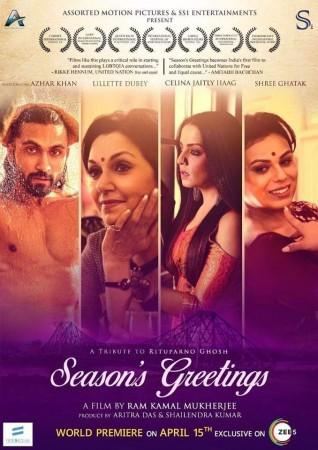There was an era when Bollywood had all our actors' responsibilities sorted. Aishwarya Rai Bachchan would be the beauty queen, Ajay Devgn, the action hero, the post 90's Amitabh Bachchan would be an elegant rich man, and Preity Zinta, the bubbly girl, who would get at least one song for herself, where she would live up to the image of her title. Meanwhile, actors such as Manoj Bajpayee, Vijay Raaz, Saurabh Shukla, Konkona Sen Sharma, would be part of strong content based films, many of us would have claimed to have watched only to appear more intelligent.

Late director Rituparno Ghosh, an occasional cross-dresser, shattered the stereotype. His ensemble included cast who were thought too commercial to work in an artistic film. Yet when they were cast opposite well-known stars from the Hindi film industry, a new kind of wave was felt in the Bengali cinema which became a much-needed face-lift.
This may be a film marking Celina Jaitly's debut in the digital medium but it is Rituparno Ghosh who makes his presence felt, even without his physical appearance on screen.
Hence, the idea to cast Celina Jaitly, an early 20's actress who gained fame for her performances in slapstick comedy was the tribute enough to the 12 times National Award-winning director who never segregated between actors and their image in the industry. In the films of Rituparno, a muscular Ajay Devgn would turn into a weak man with vulnerable expressions much like how an otherwise. Unfortunately, due to his sudden death in May 2013, in mainstream Bollywood, he will be known as the 'Raincoat', director. Despite working with every actor in the Bachchan family, in the Hindi film industry, his name does not ring a bell.

You need to be observant while watching Ram Komal Mukherjee's 'A Tribute to Rituparno Ghosh Season's Greetings' to understand that this isn't a short film about a family reunion or strained relationship between mother (Lilette Dubey) and daughter. This is a shot-by-shot, dialogue-by-dialogue, intelligent tribute to Rituparno Ghosh.
It begins with bold sequences of Romita (Jaitly) and Usmaan (Azhar Khan) getting physically intimate with each other. (Intimate scenes have become a new normal in web-platforms, however, they were considered vulgar in the era when Ghosh was building a base for himself in the industry. We learn that Romita and Usmaan are a non-married couple living with each other. They discuss marriage. Director Ram Kamal Mukherjee cleverly gives us a shot of Saif Ali Khan and Kareena Kapoor Khan in a conversation that involved a Hindu woman and a Muslim man, talk about court marriage and not giving up their religion.
With every discord between mother (Lilette Dubey) and daughter, every conversation flashback sequences alongside the backdrop of 'Gahanakuauma Kunja Majhe', urged us to remember some of the iconic works of Ghosh.
With every expression, exchange of dialogues Jaitly, Dubey and Khan keep us engaged till the arrival of the unexpected guest who makes us all remember that Ghosh was a man who was way ahead of his time. He fought for the rights of the queer in an era when homosexuality had been strongly considered to be an act against the laws of nature.
Cinematic tributes are a dicey business. We either imagine a biopic or a remake, but good thing that this team of actors and directors chose to think out of the box, much like Ghosh himself. It took Ram Kamal Mukherjee 45 minutes to pay a tribute which was restrained but extremely profound.




!['Had denied Housefull franchise as they wanted me to wear a bikini': Tia Bajpai on turning down bold scripts [Exclusive] 'Had denied Housefull franchise as they wanted me to wear a bikini': Tia Bajpai on turning down bold scripts [Exclusive]](https://data1.ibtimes.co.in/en/full/806605/had-denied-housefull-franchise-they-wanted-me-wear-bikini-tia-bajpai-turning-down-bold.png?w=220&h=135&l=50&t=40)









!['Had denied Housefull franchise as they wanted me to wear a bikini': Tia Bajpai on turning down bold scripts [Exclusive]](https://data1.ibtimes.co.in/en/full/806605/had-denied-housefull-franchise-they-wanted-me-wear-bikini-tia-bajpai-turning-down-bold.png?w=220&h=135)
